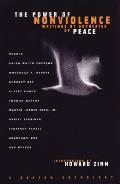 The eleventh chapter of The Power of Nonviolence: Writings by Advocates of Peace contains Albert Camus‘ 1946 essay Neither Victims nor Executioners. This week we discuss the last part of the essay, Toward Sociability. Camus wrote this 16-page essay as World War II had just ended, and it seemed as if the Soviet Union and the United States were dragging the planet into the horrors of a third world war. Eleven years later, he would win the Nobel Prize for Literature.
The eleventh chapter of The Power of Nonviolence: Writings by Advocates of Peace contains Albert Camus‘ 1946 essay Neither Victims nor Executioners. This week we discuss the last part of the essay, Toward Sociability. Camus wrote this 16-page essay as World War II had just ended, and it seemed as if the Soviet Union and the United States were dragging the planet into the horrors of a third world war. Eleven years later, he would win the Nobel Prize for Literature.
Before anyone gets distracted by sociability being a homophone for socialism, this section is about being in conversation. If you have followed along with the prior posts discussing the the earlier section of this essay, then you know that Camus equally discards capitalism and socialism as being murderously Utopian — or Dystopian.
Camus steps away from the cold logic of his argument to dicsuss the place of emotion. He finds that emotions has a place as a motivating force, but not to the effect that it distorts the goals of a nonviolent society:
But I should not want to leave the impression, in concluding, that any programme for the future can get along without our powers of love and indignation.
Camus reinforces the choice between the current murderous world and a world where killing is not acceptable. He understands that there is a cost to being a pcifist in a world where killing is the norm:
I think that I must speak out, that I must state that I will never again be one of those, whoever they be, who compromise with murder, and that I must take the consequences of such a decision.
Camus does not leave out any nation or political system in his condemnation, but he refuses to falling into the rap of hating any particular people or nation. He turns his energy toward the attitudes that we must avoid and those that we must support: Continue reading Camus’ Neither Victims nor Executioners: Toward Sociability
